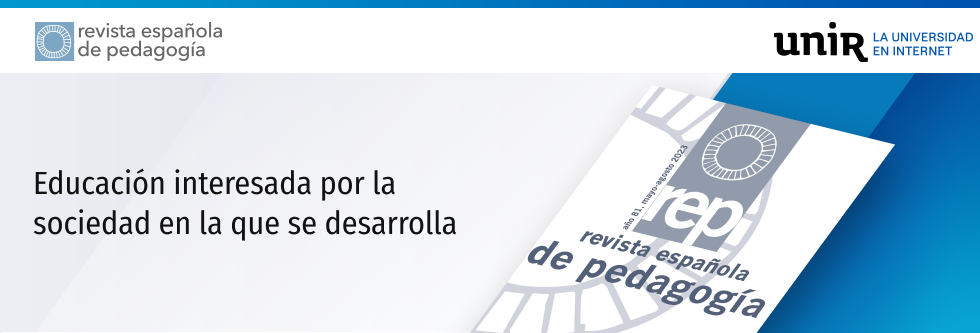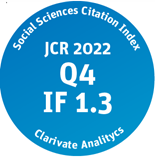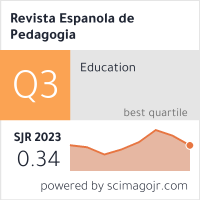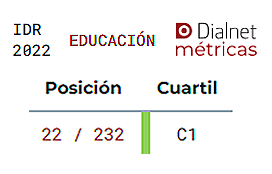Abstract
Social science journals are undergoing a process of change to reach the quality standards required by knowledge assessment agencies. This paper presents an overview of the main areas requiring improvement in order to attain a better position, visibility, and impact for these journals. Considering its remarkable trajectory that makes it a reference in the field of social sciences, the model of the journal Comunicar is analysed, pondering the relationship between articles received and accepted, authorship, methodologies, and quality criteria employed by the journal. This piece concludes with a reflection on the existence of a new academic culture, the potential quality parameters of the journals and their indicators, the importance of the author of academic texts and his or her training, the establishment of topics of interest beyond the local or individual, visibility and transference, and the incorporation of new ways of measuring the impact of work, in line with the resources of the digital society.
Cite this article as: Pérez-Rodríguez, A. M., García-Ruiz, R. and Aguaded, I. (2018). Comunicar: calidad, visibilización e impacto | Comunicar: quality, visibility and impact. Revista Española de Pedagogía, 76 (271), 481-498. doi: 10.22550/REP-3-2018-05
Referencias | References
Adie, E., & Roe, W. (2013). Altmetric: Enriching Scholarly Content with Article-level Discussion and Metrics. Learned Publishing, 26 (1), 11-17. doi: 10.1087/20130103
Aguaded, I., & Fonseca-Mora, M. C. (2012). Ejemplos de buenas prácticas en la edición de revistas científicas: Comunicar. In FECYT (Ed.), Manual de buenas prácticas en edición de revistas científicas (pp. 11-20). Madrid: MIC. Retrieved from https://goo.gl/GXsYUL (Consulted on 06/06/2018).
Alcaín-Partearroyo, M. D., Román-Román, A., & Giménez Toledo, E. (2008). Categorización de las revistas españolas de Ciencias Sociales y Humanas en RESH. Revista Española de Documentación Científica, 31 (1), 85-95. Retrieved from https://bit.ly/2LYSi6E (Consulted on 06/06/2018).
Alonso-Arévalo, J., & Vázquez-Vázquez, M. (2016). Altmetrics y alfabetización científica. Bibliotecas. Anales de Investigación, 12 (1), 14-29. Retrieved from http://revistas.bnjm.cu/index.php/anales/article/view/3634/0 (Consulted on 06/06/2018).
Andersen, H. (2000). Influence and Reputation in the Social Sciences - How much do Researchers Agree? Journal of Documentation, 56, 674-692.
Baiget, T. (2014). Las revistas científicas ante la digitalización y la globalización. Revista Española de Drogodependencias, 39 (1), 5-11. Retrieved from http://eprints.rclis.org/31544/1/EditorialRevista-espanola-drogodependencias.pdf
Baiget, T., & Torres-Salinas, D. (2013). Informe APEI sobre publicación en revistas científicas. Gijón: Asociación Profesional de Especialistas en Información. Retrieved from https://bit.ly/1DlAVWw (Consulted on 06/06/2018).
Corrêa Jr., E. A., Silva, F. N., Costa, L. da F., & Amancio, D. R. (2017). Patterns of authors contribution in scientific manuscripts. Journal of Informetrics, 11 (2), 498-510. doi: 10.1016/j.joi.2017.03.003
Delgado, E., Ruiz-Pérez, R., & Jiménez, E. (2006). La edición de revistas científicas. Directrices, criterios y modelos de evaluación. Madrid: Fundación Española para la Ciencia y la Tecnología. Retrieved from https://bit.ly/2kMpH81 (Consulted on 06/06/2018).
Escribà, E., & Cortiñas, S. (2013). La internacionalización y las coautorías en las principales revistas científicas de Comunicación en España. Comunicar, 21 (41), 35-44. doi: 10.3916/C41-2013-03
Forrester, A., Björk, B.-C., & Tenopir, C. (2017). New web services that help authors choose journals. Learned Publishing, 30 (4), 281-287. doi: 10.1002/leap.1112
Giménez-Toledo, E. (2014). Imposturas en el ecosistema de la publicación científica. Revista de Investigación Educativa, 32 (1), 13-23. doi: 10.6018/rie.32.1.190251
Grupo Comunicar (2018). Estadísticas. Huelva: Comunicar. Retrieved from https://www.revistacomunicar.com/index.php?contenido=estadisticas (Consulted on 06/06/2018).
Hengl, T., Gould, M., & Gerritsma, W. (2011). The unofficial guide for authors: from research design to publication. Retrieved from http://edepot.wur.nl/178013 (Consulted on 06/06/2018).
Hirsch, J. E. (2005). An index to quantify an individual’s scientific research output. Proceedings of the National academy of Sciences of the United States of America, 102 (46), 16569-16572. doi: 10.1073/pnas.0507655102
Moreno-Pulido, A., López-González. M. Á., Rubio-Garay, F., Saúl, L. A., & Sánchez-Elvira-Paniagua, Á. (2013). Evolución de las revistas españolas de Ciencias Sociales en el Journal Citation Reports (2006-2010) y su valoración como indicio de calidad en la normativa evaluadora española. Revista Española de Documentación Científica, 36 (3), 1-15. doi: 10.3989/redc.2013.3.987
Perales-Palacios, F. J., Vílchez-González, J. M., & Gutiérrez-Pérez, J. (2017). Información de autor y estándares de calidad previos en revistas internacionales sobre educación científica. Investigación Bibliotecológica, 31 (72), 139-159.
Petersen, J. (2017). How innovative are editors?: Evidence across journals and disciplines. Research Evaluation, 26 (3), 2017, 256-268. doi: 10.1093/reseval/rvx015
Repiso, R. (2015). Cómo identificar una revista de calidad. Cardiocore, 50 (2), 46-48. doi: 10.1016/j.carcor.2014.12.002
Torres-Salinas, D., Cabezas, Á., & Jiménez, E. (2013). Altmetrics: nuevos indicadores para la comunicación científica en la Web 2.0. Comunicar, 21 (41), 53-60. doi: 10.3916/C41-2013-05
Citación recomendada | Recommended citation
Pérez-Rodríguez, M. A., García-Ruiz, R., & Aguaded, I. (2018) . Comunicar: quality, visibility, and impact. Revista Española de Pedagogía, 76(271). https://www.revistadepedagogia.org/rep/vol76/iss271/10
Licencia Creative Commons | Creative Commons License
Esta obra está bajo una licencia internacional Creative Commons Atribución-NoComercial 4.0.
This work is licensed under a Creative Commons Attribution-NonCommercial 4.0 International License
Palabras clave | Keywords
academicpublication, impact, indexation, qualitystandards, scientificdivulgation


 https://orcid.org/0000-0001-8312-5412
https://orcid.org/0000-0001-8312-5412 



